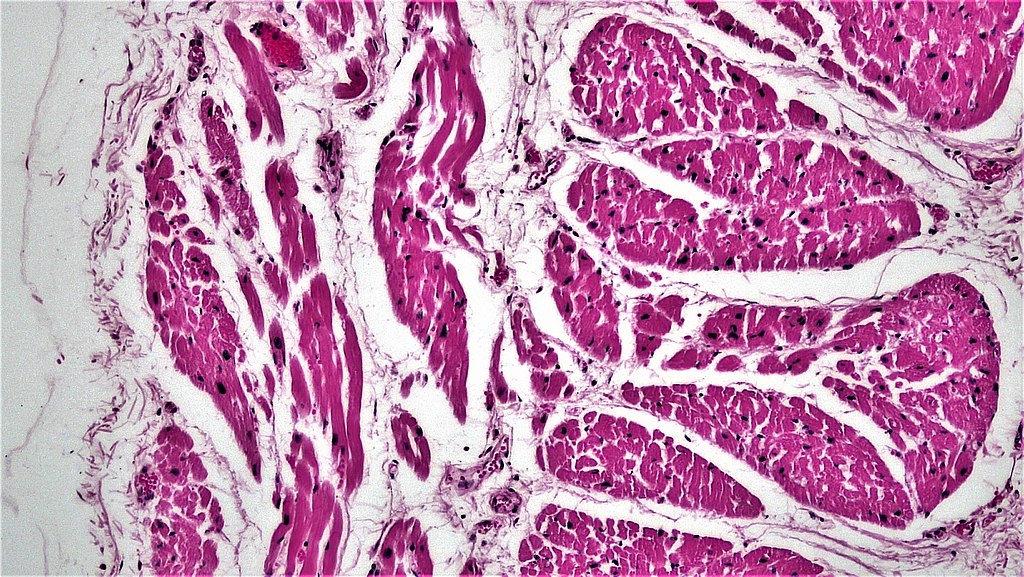August 31, 2018
Desmoplakin and heart failure
Two NU researchers with ties to CBC, Kathleen Green and Karla Satchell, provide new insight into the molecular mechanisms behind the disease
Faulty intercellular junctions such as desmosomes can cause many diseases, including cardiac arrhythmias and problems with skin. In an article from the Green lab, NU, recently published in the Journal of Cell Biology, the authors begin dissecting the downstream signaling pathway that is disrupted by mutations in the desmosome main component, desmoplakin. Senior author on the publication, Kathleen Green, has many ties to CBC. Together with postdocs in her lab, Joshua Broussard and Adi Dubash, she received a pair of CBC Postdoctoral Research (PDR) Awards (2015 and 2014, respectively). Green has also frequently served on CBC review boards and panels (see below). Karla Satchell, a co-author on the published study, also received a CBC PDR Award (2015) with her postdoc, Marco Biancucci. Congratulations to all researchers involved in the new study! The CBC is also grateful to Kathleen Green for her time and support of the CBC activities.
Mechanisms Driving Inherited Heart Disease
Northwestern Medicine News Center | by ANNA WILLIAMS | August 10, 2018

Cardiac Muscle. Source: Wikimedia Commons.
Northwestern Medicine scientists have identified a novel molecular mechanism for how mutations in desmoplakin — a protein that helps cells stick together — can lead to cardiac arrhythmias and other diseases of the heart and skin.
The study, published in the Journal of Cell Biology, was led by Kathleen Green, PhD, the Joseph L. Mayberry, Sr., Professor of Pathology and Toxicology in the Departments of Pathology and Dermatology. Chen Kam, PhD, a former doctoral student in the Walter S. and Lucienne Driskill Graduate Program, was the first author of the paper.
Desmoplakin is a critical protein component of desmosomes, junctions that hold cells together, especially in heart muscle and the outer layer of skin.
Mutations in the gene for desmoplakin have been strongly associated with certain heart and skin disorders, in particular, arrhythmogenic cardiomyopathy (ACM), an inherited heart disease that can lead to arrhythmias and sudden death in young adults. ACM occurs when healthy heart tissue is damaged and replaced by fibrous scar and fat tissue, interfering with the heart’s ability to beat.
Previously, research had suggested that decreased expression of a protein called connexin-43 — the major component of gap junctions, which allow communication between cells — may play a role in ACM pathogenesis. But the link between loss of desmoplakin and decreased expression of connexin-43 was unclear.
In the new study, the team of scientists demonstrated that desmoplakin controls expression of connexin-43. Loss of desmoplakin triggered strong activation of the ERK1/2–MAPK signaling pathway and phosphorylation of two sites on connexin-43, leading to the degradation of connexin-43 and impaired gap junction communication.
The scientists further identified the protein Ras as a key link between desmoplakin and connexin-43 regulation, and they demonstrated that a novel Ras inhibitor called RSSP could be used to restore connexin expression levels and gap junction function.
“This suggests a potential new therapeutic use for this novel reagent,” said Green, who notes that RSSP, which is derived from a bacterial toxin, is being further developed for treatment of other Ras-dependent cancers and diseases by the laboratory of Karla Satchell, PhD, professor of Microbiology-Immunology and also a co-author of this study.
Future research will also focus on determining how desmoplakin regulates levels of Ras mRNA, Green said.
“A deeper understanding of the molecular pathway linking desmoplakin to Ras regulation may reveal additional novel targets for treatment of cardiac disorders, cancer and other human diseases,” Green said.
Green and Satchell are both members of the Robert H. Lurie Comprehensive Cancer Center of Northwestern University.
The study was supported by National Institutes of Health (NIH) grants R37AR43380 and GM55632, the J.L. Mayberry Endowment, NIH/National Heart, Lung and Blood Institute grant R01 HL09780-06, the Tobacco-Related Disease Research Program (24RT-022), a Translational Research Grant from the Robert H. Lurie Comprehensive Cancer Center of Northwestern University, the Northwestern Medicine Catalyst Fund, the Associazione Italiana per la Ricerca sul Cancro (IG11627), Worldwide Cancer Research (11-0051) and an American Heart Association predoctoral fellowship (15PRE25560138).
Source:
Adapted (with modifications) from the Northwestern Medicine News Center, by Anna Williams, published on August 10, 2018.
Citation:
Kam CY, Dubash AD, Magistrati E, Polo S, Satchell KJF, Sheikh F, Lampe PD, Green KJ. Desmoplakin maintains gap junctions by inhibiting Ras/MAPK and lysosomal degradation of connexin-43. J Cell Biol. 2018 Jun 29. [Epub ahead of print] (PubMed)
Featured scientist(s) with ties to cbc:
Kathleen Green, NU
- CBC Postdoctoral Research Award (2015):
▸ Adhesion-based Regulation of Intracellular Forces in Live-cell Organotypic Cultures
PIs: Joshua Broussard (postdoc) and Kathleen Green (NU) - CBC Postdoctoral Research Award (2014):
▸ Regulation of gene expression by desmosomal armadillo proteins in cardiac cells
PIs: Adi Dubash (postdoc) and Kathleen Green (NU) - CBC Catalyst Review Board (CRB) (2006-2007):
▸ Current Membership
Kathleen Green (NU) — Past Board Member - CBC Spark Council (SC):
Kathleen Green (NU) — Past Council Member - CBC Spark Review Panel:
Kathleen Green (NU) — Past Panel Member
Karla Satchell, NU
- CBC Postdoctoral Research Award (2015):
▸ Identifying Inhibitors of Novel Ras Bacterial Protease by High Throughput Screening
PIs: Marco Biancucci (postdoc) and Karla Fullner Satchell (NU)


